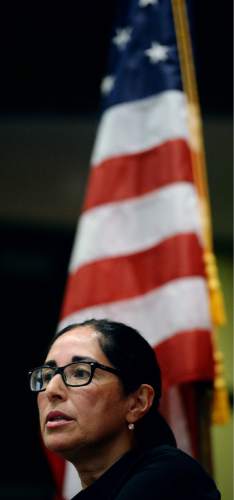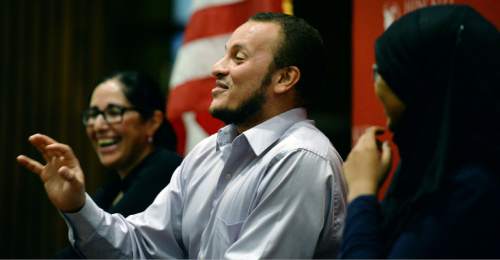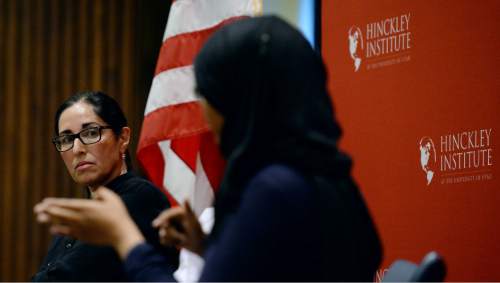This is an archived article that was published on sltrib.com in 2016, and information in the article may be outdated. It is provided only for personal research purposes and may not be reprinted.
Freedom, fear, hope and cynicism.
Those are just some of the feelings Muslims in this country cope with 15 years after the 9/11 attacks on the Twin Towers and the Pentagon.
The lives of Muslims in America encompass a complex set of social norms buffeted by political winds and fallout from terrorism.
For Amr Abdelghany, an initial visit to the United States from Egypt was the first time he felt free to practice his religion as he pleased. That was in North Carolina in 2009.
"The governments we see in the Middle East are using religion to control the people," he said Monday at a panel discussion on the campus of the University of Utah hosted by the Hinckley Institute of Politics. "When you are not obeying the king or the president, you are not obeying Allah."
He said it follows that those who oppose their governments — or others — would use religion to foment terror.
Conditions for Muslims in Utah are good, according to Abdelghany, who is the acting president of the Muslim Students Association (MSA) at the U.
"In Utah, I haven't faced any hate speech," he said. "The people here are friendly, open-minded and very accepting of my religion."
He was joined on the panel by Soheila Amirsoleimani, a U. professor of world languages and culture; and Amaal Sharif, an MSA board member.
Although American-born Sharif was too young to remember the aftermath of 9/11, her parents have recounted to her the frightening aspects of some in the dominant white culture demonizing all Muslims and Middle Easterners.
These days, terrorism and the presidential race are cause for concern, she said.
"The fact that Donald Trump says all these things [about banning Muslims] and people support him — that scares me the most," Sharif said. "Don't barter with our lives. Play at politics elsewhere."
Many terrorist acts are blamed on "radicalized" Muslims, said Amirsoleimani. But she disagrees with the label.
Most of the terror is spread by people who are not practicing Muslims, she said.
She also responded to criticism that Muslims don't speak out against terrorism.
"The leaders of the Council on American-Islamic Relations (CAIR) condemn acts of terrorism vociferously," she said. "In almost every case, terror is condemned by Muslims but it is not reflected in the mainstream media."
Responding to a student member of the audience, Amirsoleimani said she was at a loss to propose policies that might ease tensions between the United States and Middle Eastern countries.
"What I see is a complete mess of wrong [U.S.] policies," said the Iranian-born professor.
She noted, however, that America's unwavering support of Saudi Arabia is not well founded. She called the Saudi government "one of the worst culprits" in destabilizing the Middle East, adding "our leaders in this country refuse to even question them."
By and large, the people of that region hate America, Abdelghany said, because the United States is seen as supporting oppressive regimes and practicing violence, or condoning it, against everyday people.
"When I came here, my personal point of view changed," he said. "The American people are open-minded. They are completely unlike the American government."
If the people of the Middle East and the people of the United States were to get to know one another, many of the present-day problems would not exist, Abdelghany said. If Middle Easterners could visit the United States, the animosity would evaporate when they saw the good nature of Americans.
"Let them understand that freedom is sweet," he said. "That's why I Iike this country."







